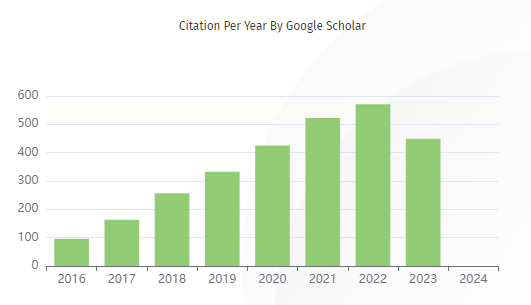Implementasi Digital Factory pada Industri Manufaktur Skala Menengah: Studi Pendahuluan
DOI:
https://doi.org/10.12695/jmt.2016.15.3.2Keywords:
manufacturing industry, medium-sized enterprise, digital factory, sustainabilityAbstract
Abstrak. Industri manufaktur skala menengah di Indonesia dihadapkan pada beberapa tantangan, seperti: ekonomi biaya tinggi, perubahan teknologi informasi yang pesat, serta perubahan permintaan dan pasar yang sangat dinamis. Tantangan-tantangan tersebut secara langsung maupun tidak langsung mempengaruhi keberlangsungan hidup perusahaan. Studi pendahuluan ini bertujuan untuk memperkenalkan manfaat implementasi Digital Factory dalam mengatasi beberapa tantangan tersebut. Penelitian-penelitian sebelumnya mengidentifikasikan bahwa penerapan digital factory pada perusahaan skala besar berbasis teknologi telah mampu meningkatkan efisiensi proses pengembangan produk dan proses produksi, dari segi waktu dan biaya. Studi ini mencoba mengidentifikasi beberapa prasyarat utama implementasi digital factory dalam industri manufaktur skala menengah di Indonesia. Sebagai studi pendahuluan, penelitian dilakukan pada usaha pengolahan plastik skala menengah di Tangerang, yang telah menerapkan teknologi digital dalam proses produksinya. Terdapat tiga prasyarat mendasar yang dibutuhkan agar implementasi digital factory dapat berjalan: kelengkapan data dan informasi tentang urutan produksi, desain produk, desain bangunan dan data pekerja; ketersediaan perangkat keras dan perangkat lunak simulasi; serta tingkat ketrampilan dan pengalaman operator dalam penggunaan software simulasi. Hubungan antar variabel dalam penelitian ini dimodelkan dan diolah dengan SmartPLS. Penelitian awal ini menemukan bahwa kelengkapan data dan informasi, ketersediaan perangkat keras dan lunak simulasi, serta kemampuan dan pengalaman pekerja dalam bidang simulasi virtual, secara bersama-sama memiliki pengaruh signifikan terhadap implementasi digital factory dan keberlangsungan perusahaan (pengembangan dan desain produk yang lebih baik (inovasi), perancangan dan simulasi proses produksi yang lebih efisien (efisiensi), dan kemampuan menyesuaikan diri terhadap perubahan permintaan yang lebih baik (adaptasi)).
Kata kunci: usaha manufaktur skala menengah, digital factory, inovasi, efisiensi, adaptasi.
Abstract. Medium-sized manufacturing industry in Indonesia is overwhelmed by certain challenges: high-cost economy, significant changes in information technology, and dynamic market and demand. All of these challenges affect gradually or directly to the sustainability of the industry. This preliminary study aims to conceptualize the importance of 'digital factory' implementation to dealing with sustainability issues. Previous studies showed that the implementation of digital factory, in the context of large-sized technological-based manufacturing enterprises, has been proved to increase the efficiency of product development process and production process, in term of time and cost. This study tries to identify several key issues to support the implementation of digital factory: data and information completeness, hardware and software availability, and operators' skill and experience in conducting simulation. The relationships of the variables are modelled and analyzed using SmartPLS. This preliminary study found that, concurrently, data and information completeness, hardware and software availability, and operators' skill and experience in conducting simulation have significant effect to digital factory implementation, as well as the enterprise's sustainability (better product design and improvement (innovativeness), more efficient in design and simulation of production process (efficiency), and better capability to deal with dynamic demand (adaptiveness)).
Keywords: medium-sized manufacturing enterprise, digital factory, innovativeness, efficiency, adaptiveness.
Downloads
References
Agwu, M. O., & Emeti, C. I. (2014). Issues, challenges and prospects of small and medium scale enterprises (SMEs) in Port-Harcourt City, Nigeria. European Journal of Sustainable Development, 3 (1), 101 – 114.
Al-Tmeemy, S. M. H., Abdul-Rahman, H., & Harun, Z. (2010). Future criteria for success of building projects in Malaysia. International Journal of Project Management, 29 (3), 337 – 348.
Badan Pusat Statistik (2014). Jumlah perusahaan industri besar sedang menurut SubSektor [diunduh 23 Maret 2015 dari www.bps.go.id].
Bank Indonesia (2011). Buku kajian akademik pemeringkat kredit bagi usaha mikro, kecil dan menengah di Indonesia. Jakarta: Bank Indonesia [diunduh 23 Maret 2015 dari www.bi.go.id]
Barlett, A.A. (2012). The meaning of sustainability. Teachers Clearinghouse for Science and Society Education Newsletter, 31 (1), 1-17.
Bley, H. & Zenner, C. (2005), Handling of process and resource variants in the digital factory. CIRP Journal of Manufacturing Systems, 34 (2), 187-194.
Rohrlack, T. (2008). The digital factory: from concept to reality. Bentley Solutions [diunduh 23 Maret 2015 dari www.bentley.com].
Bonini, S. & Gorner, S. (2011). The business of sustainability: putting it into practice. sustainability & resource productivity practice, McKinsey & Company [diunduh 14 Juni 2015 dari www.mckinsey.com].
Brian, G.F. & Shingirayi, M. (2013). Challenges faced by small to medium scale enterprises: A case study of Chitungwiza, Zimbabwe. Greener Journal of Business and Managenet Studies, 4 (4), 103 – 107.
Busch, T., Stinchfield, B.T. dan Wood, M.S. (2011). A triptych inquiry: rethinking sustainability, innovation, and financial performance. [Working Paper]. Duisenberg School of Finance - Tinbergen Institute Discussion Paper [diunduh pada 11 Juli 2015 dari www.papers.tinbergen.nl].
Caggiano, A. (2010). Digital factory concept implementation for flexible and reconfigurable manufacturing systems modelling and analysis [Thesis]. Napoli: Universita Degli Studi di Napoli Federico II, Italia.
Clark, G. L., Feiner, A. & Viehs, M. (2014). From the stockholder to the stakeholder: how sustainability can drive financial outperformance. [Working Paper]. Oxford: University of Oxford [diunduh pada 24 Juni 2015 dari www.smithschool.ox.ac.uk].
Dassault Systemes. (2010). DELMIA Version 5 Release 20 Modification Level 0. Dassault Systemes [diunduh 23 Maret 2015 dari www.3ds.com].
Delmia (2010). Solutions Portfolio. DELMIA. Paris.
Earns & Young (2013). 2013 Six growing trends in corporate sustainability. GreenBiz corporation [diunduh pada 15 Juni 2015 dari www.ey.com].
Furmann, R. (2007). The proposal of an algorithm for layout design in virtual environment. [Dissertation Thesis]. Slovakia: University of Zilina, Mechanical Engineering Faculty.
Furmann, R. & KrajÄoviÄ, M. (2009). Interactive 3D design of production systems. In: Digital Factory 2009 – Workshop Handbook, SLCP, Žilina, pp.28.
Gregor, M. & Medvecky, S. (2010). Digital factory: theory and practice. Engineering the Future, Laszlo Dudas (Ed.), InTech, [diunduh 23 Maret 2015 dari www.intechopen.com].
Hsieh, C. T. & Olken, B. A. (2014). The missing “Missing Middleâ€. Journal of Economic Perspectives, 28 (3), 89-108.
Kazimoto, P. (2014). Assessment of challenges facing small and medium enterprises towards International Marketing Standards: a Case Study of Arusha Region Tanzania. International Journal of Academic Research in Accounting, Finance and Management Sciences, 4 (2), 303 – 311.
Kementerian Koperasi dan Usaha Kecil Menengah (2014). Perkembangan data usaha mikro, kecil, menengah (UMKM) dan Usaha Besar (UB) 2012-2013. Jakarta: Kementerian Koperasi dan UKM Republik Indonesia [diunduh 23 Maret 2015 dari www.bi.go.id].
Kuehn, W. (2006). Digital factory – integration of simulation enhancing the product and production process towards operative control and optimization. International Journal of Simulation, 7 (7), 27-39.
Kuhlman, T. & Farrington, J. (2010). What is sustainability?. Sustainability , 2 (11), 3436 – 3448.
Kurkin, O. & Bures, M. (2011). Evaluation of operational times by MTM Methods in the Digital Factory Environtment. Annals of DAAAM the 22nd International DAAAM Symposium, Vienna, Austria, 2011, 22 (1), 671-672.
Latan, H. & Ghozali, I. (2012). Partial least squares: konsep, teknik dan aplikasi menggunakan SmartPLS 2.0. Semarang: Penerbit Universitas Diponegoro.
Leon, R. (2013). From the sustainable organization to sustainable knowledge-based organization. Economics Insights-Trends and Challenges, 2 (2), 63 – 73.
Manenti, P. (2014). The Digital factory: game-changing technologies that will transform manufacturing industry. SCM World Report, 29 November 2014 [diunduh 04 Januari 2015 dari www.scmworld.com].
SCM World (2014). The Future of manufacturing. [diunduh 23 Maret 2015 dari www.scmworld.com].
Stefani, V. & Sunardi, O. (2014). Peran Dependency, Commitment, Trust dan Communication terhadap Kolaborasi Rantai Pasok dan Kinerja Perusahaan: Studi Pendahuluan. Jurnal Manajemen Teknologi, 13 (3), 322-333.
Sunardi, O. & Tjakraatmadja, J. H. (2013). Enablers to Knowledge Management Implementation in Indonesian Medium-sized Manufacturing Enterprises: A Preliminary Study. Prosiding ilmiah pada 12th International DSI dan the 18th Asia Pacific DSI Conference, Bali, Indonesia, 2013 [diunduh pada 20 Juli 2015 dari www.gebrc.nccu.edu.tw].
Tambunan, T. (2011). The Impacts of trade liberalization on Indonesian small and medium-sized enterprises. International Institute for Sustainable Development. TKN Policy Paper.
Tambunan, T. & Chandra, A.C. (2014). Utilisation Rate of Free Trade Agreements (FTAs) by Local Micro-, Small- and Medium-Sized Enterprises: A Story of ASEAN. Journal of International Business and Economics, 2(2), 133-163.
Yin, R.K. (2009). Case study research: design and methods, 5th Edition. Google Books [serial online] [diunduh 4 Mei 2015 dari https://books.google.com].
Westkämper, E., Constantinescu, C., & Hummel, V. (2006). New paradigm in manufacturing engineering: factory life cycle. Annals of the Academic Society for Production Engineering. Research and Development, 13, 143-146.
Downloads
Submitted
Accepted
Published
How to Cite
Issue
Section
License

This work is licensed under a Creative Commons Attribution-NonCommercial-ShareAlike 4.0 International License. Copyright @2023. This is an open-access article distributed under the terms of the Creative Commons Attribution-NonCommercial-ShareAlike 4.0 International License (http://creativecommons.org/licenses/by-nc-sa/4.0/) which permits unrestricted non-commercial used, distribution and reproduction in any medium.

















